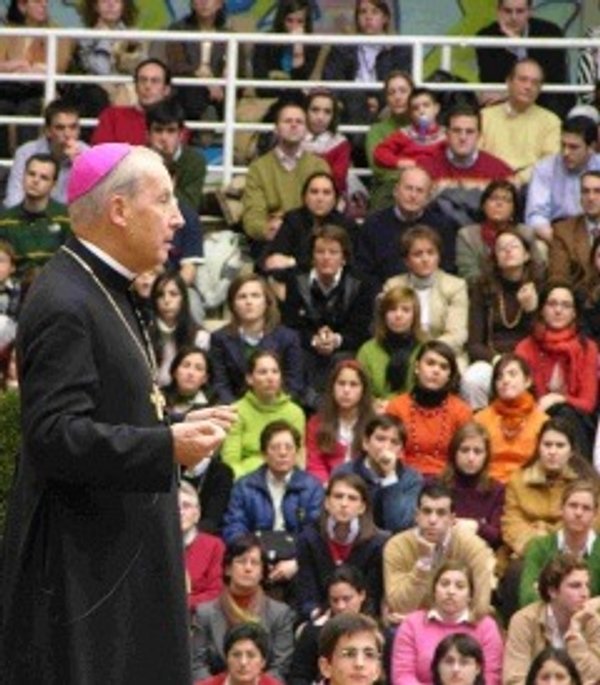The Prelate began by encouraging those present “to act like real Catholics. When you pass a church, stop in and spend a few minutes with Jesus. He will be with you in sorrow, work, and when you are alone.”
Bishop Echevarría went on to point out the importance for family life of distributing the small jobs around the home: “After you’ve worked hard all day and come home tired, Jesus will help you to look after everyone. Instead of thinking about yourself, be generous, and listen patiently to the children and to your spouse.”
“Christ,” he continued, “wants to live in your houses with your families. Don’t shut him out! And don’t leave him alone! Together with Him, you’ll be better parents, better brothers and sisters, better students, better workers. Everything you do will improve because Christ will be there in your everyday life. He will bring us peace, and we can pass it along to others. Sometimes your friends won’t pay much attention to you, but at other times they’ll say, ‘Hey, why are you always so happy?’”
The Prelate also referred to “that antiquated foolishness that Opus Dei is only for wealthy people. Opus Dei is for everybody, for the rich and for the poor (which means the majority of people, and some are as ‘poor as church mice’), for the healthy and the sick, for old and young, for laborers and intellectuals. Opus Dei is for everybody, because the Lord asks us all to be generous in giving our lives in the service of others.”
Bishop Echevarría spiced his remarks with entertaining anecdotes that illustrated with practical examples the Christian message he was explaining. When he took questions, a city bus driver and member of Opus Dei asked how he might improve his work. The Prelate responded: “Right there at the wheel you can spread joy and peace. Offer your work to God, even when you are tired, and pray for your passengers.”
He also encouraged the large number of people who devote themselves professionally to domestic service: “Carry out your work as a true service that decisively influences the shape of society by bringing together the technical knowledge of your profession with a human understanding of persons. There’s no doubt that the service sector makes a huge impact on daily life.”
Responding to a mother of five who asked him to speak about the joy that goes with having a large family, the Prelate said: “God shows his confidence in parents by sending them children. Don’t be afraid to bear children. And if God doesn’t send any, that, too, is a blessing for it frees you to devote yourselves to other ways of serving.”
In that vein, a professional woman whose mother is suffering from Alzheimer’s disease asked about caring for the terminally ill. “Give to each person the attention he requires,” Bishop Echevarría responded, “for each one of us needs to feel cared for, accompanied, and loved. The whole family benefits when the Christian meaning of pain is understood.”
During the get-together, a group of young people sang a Castilian song, “Tan buen ganadico’ (‘What a fine flock’), and several children brought up gifts. Later, the Prelate spoke to parents about the schools that help educate their children: “You have a right and a duty to take part in their education. Be friends of your children so that they can bring their problems to you without fear. See that they grow strong spiritually as well as physically.”
As the get-together was ending, Bishop Echevarría made a prayer request for the Holy Father’s health: “He has given his life for the world and for the Church. Although he is ready to go, he needs your prayers. He loves us all madly. There’s no reason to grieve over him; the Pope is an example of patience in the way he follows the doctors’ orders. Now he is gladly serving the Church with his infirmity, showing us that for a Christian, suffering is not a punishment—just as the suffering of Christ on the Cross was not a punishment. Jesus took up the Cross precisely out of love and to serve souls. This is why infirmity is a great treasure for the sick person, for the Church, and for the many people who are still without faith.”
